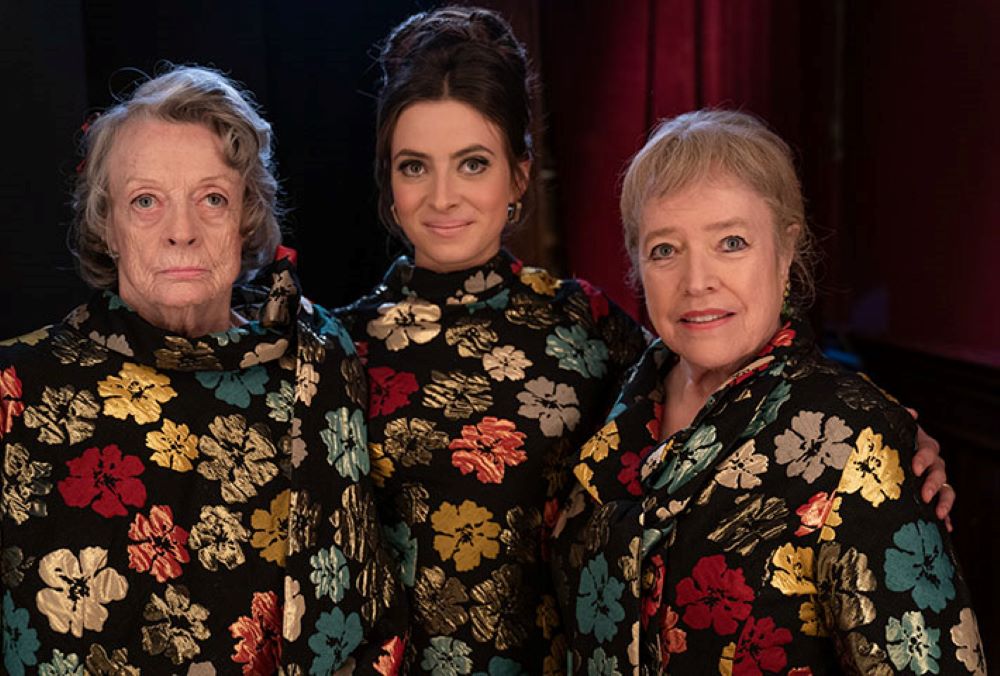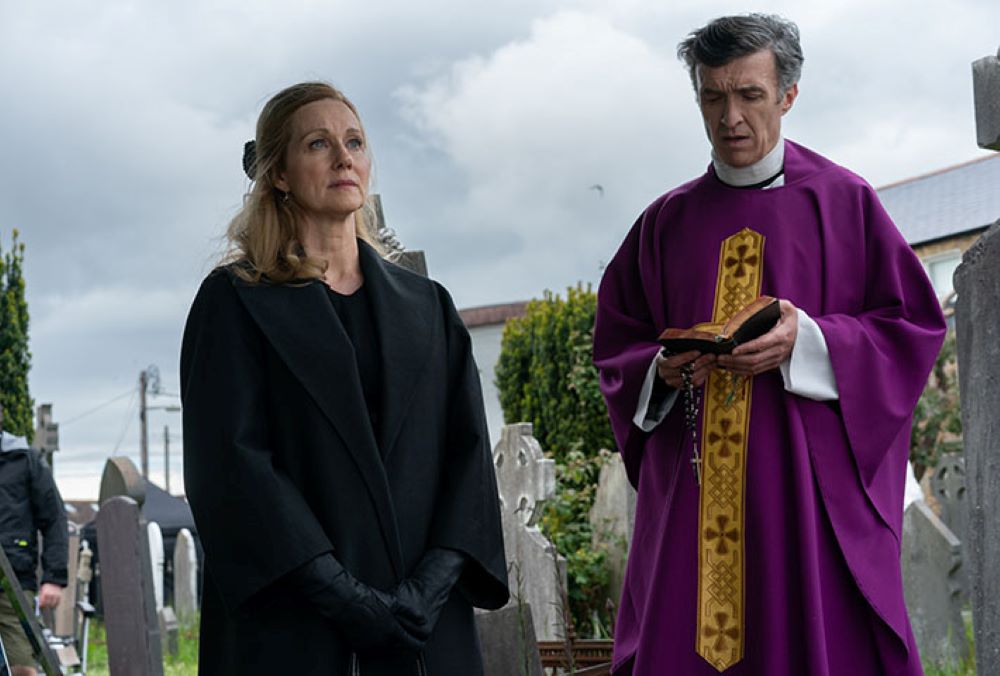
Maggie Smith as Lily Fox, Agnes O'Casey as Dolly and Kathy Bates as Eileen Dunne appear at the Ballygar All Stars Talent Show in "The Miracle Club." (Courtesy of Sony Pictures Classics/Jonathan Hession)
Thaddeus O'Sullivan's new Sony Pictures Classics film "The Miracle Club" makes miracles palatable to the secular viewer.
The film purports that miracles aren’t lightning strikes from God, but rather moments in which ordinary men and women summon supernatural amounts of grace and courage. In short, "The Miracle Club" forgoes the salt of Christianity for the sugar of humanism. While this may lack flavor for some Catholic viewers, it’s a worthwhile appetizer for just about anyone else.
What is the sweet spot between ideological accessibility and doctrinal adherence? Should we create more films for the Christianity-curious but pew-shy? Is there merit in Catholic-adjacent films that you can watch and discuss with your agnostic and atheist friends? Is Lourdes for everyone? Are miracles for everyone, even nonbelievers?
"The Miracle Club" is set in 1967 Dublin and opens to a sweet and funny sequence of Lily (Maggie Smith), Eileen (Kathy Bates) and Dolly (Agnes O’Casey) competing in a church talent show for the chance to visit the baths at Lourdes, the holy site in France. They hope the visit will give Dolly's son, who does not speak, his voice. The women win the tickets, and then harangue, threaten and trick their husbands into taking on the housework in their absence.
But a wrench is thrown in their plans right as they're about to leave for Lourdes. Chrissie (Laura Linney) returns to their small town, unannounced and unexpected after 40 years in America. Slowly, the film reveals that Chrissie isn't just an estranged neighbor: She was Eileen's best friend and Lily's deceased son's teenage love. At the encouragement of the local priest and to the dismay of the other women, Chrissie joins the Lourdes pilgrimage at the last minute.

Laura Linney as Chrissie prepares to bury her mother alongside Mark O'Halloran as Fr. Dermot Byrne in "The Miracle Club." She later joins the pilgrimage to Lourdes. (Courtesy of Sony Pictures Classics/Jonathan Hession)
The group goes to Lourdes, and while I won’t ruin the story, I will say that Linney personifies mercy and grace in her portrayal of Chrissie. I had the chance to speak with the actress ("Ozark," "The Big C," "Love Actually") and asked where she encounters mercy, as her tender performance suggests an intimate acquaintance with the virtue.
Linney told me:
Most of the really important lessons and qualities in my life, I have learned from the theater and from being in the theater. And being in service to the theater ... Some people learn them in church, some people learn them in various [other] places but me, it's the arts. I see mercy in the arts, everywhere.
For someone like me, who considers the theater its own kind of sacred, Laura's words rang true and returned me to my original line of thought: Who should tell Catholic stories — and how should they tell them?
Linney found something big and important in creating this character. And while church and Scripture have always been, and will continue to be, my fount of mercy and justice, I'd be lying if I said secular theater, film, music and art have not also served as paradigms to deepen my understanding of virtue. Perhaps that's the wrong word. Perhaps films like "The Miracle Club" act more like prisms through which I can examine my own moral absolutism in challenging and important ways.
Advertisement
This film does a commendable job of explaining that the majority of modern-day miracles are, in fact, simply the ways we choose to love and forgive each other — even if the film fails to credit the source of that love and forgiveness.
Some may consider that omission the great weakness of "The Miracle Club." But maybe it's also the film's great strength. You can take your non-Christian friends to this film and share your faith in a way they will be able to receive. You can find common ground on forgiveness, mercy and grace — words that many people sadly find antithetical to Catholicism, either from personal experience or media-fed perception.
You can use this film as an opportunity, not to talk at your secular friends, but instead, to listen. Where do they believe mercy comes from? Do they believe in miracles? Are they looking for one and, if so, how can you help?
Some Catholic viewers may find it hard to watch a film about Lourdes that references the miracles of St. Bernadette and Our Lady as dubious rumors rather than church-approved apparition. But if you’re looking for films that celebrate Lourdes in its totality, they already exist.
Perhaps it was time for a film that told the story from a new perspective to new audiences. And if Bernadette's faith could reach even one person from this film, wouldn't that be a miracle?








